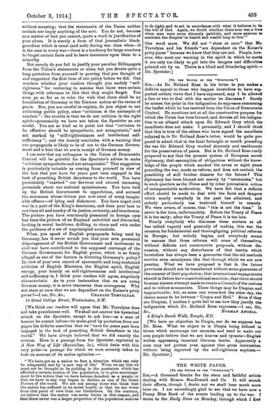[To MP EOM' OP ISE "SPZCIATOR."1 SIR,—As Dr. Holland Rose
in his letter to you makes a definite appeal to those who happen heretofore to have sup- ported certain views that I have expressed, may I be allowed a line or two to deal with the matter he discusses P Surely he misses the point in the indignation he expresses concerning the leaflet which he has received from the Union of Democratic Control. He mentions not at all the constructive purpose for which the Union has been formed, and devotes all his indigna- tion to an alleged attack upon Sir Edward Grey which the manifesto does not make. I personally, and I should think that this is true of the others who have signed the manifesto referred to in Dr. Holland Rose's letter, would be quite pre- pared to admit that in the fatal fortnight or month preceding the war Sir Edward Grey worked sincerely and assiduously for the preservation of peace. But is Dr. Holland Rose really prepared to say that the present system of European secret diplomacy, that assumption of obligations without the know- ledge of the people which marked the seven or eight years preceding the war, needs no reform, and does not contain the possibility of still further disaster for the future P This diplomacy has been blamed not merely by "extremists," but in such quarters as the Times and by other journalistic critics of unimpeachable moderation. We have felt that a definite effort should be made to deal with the facts and dangers which nearly everybody in the past has admitted, and nobody particularly has bestirred himself to remedy. We were aware, of course, that " this is not the time." It never is the time, unfortunately. Before the Treaty of Peace it is too early; after the Treaty of Peace it is too late.
Nearly everybody who discusses these matters at all has talked vaguely and generally of making this war the occasion for fundamental and thoroughgoing political reforms in Europe ; but nobody begins, and everybody seems to assume that these reforms will come of themselves, without definite and constructive proposals, without dis- cussion, without any disturbance of that inertia which heretofore has always been a guarantee that the old method, survive even cataclysms like that through which we are now passing. What we have proposed is that in the future provinces should not be transferred without some guarantee of the consent of their population; that international engagements should in future have constitutional sanction ; that there should be some sincere attempt made to create a Council of the nations and to reduce armaments. These things may be Utopian and impracticable; but, as some one remarked the other day, the choice seems to be between " Utopia and Hell." Even if they are Utopian, I confess I quite fail to see how they justify the indignation which Dr. Holland Rose expresses.—I am, Sir, [We have no objection to Utopia, nor do we suppose has Dr. Rose. What we object to is Utopia being defined in terms which encourage our enemies, and tend to make our own people believe that we are knaves and tyrants—English wolves oppressing innocent German lambs. Apparently a man may not protest even against that gross insinuation without being reproved by the self-righteous sophists.— ED. Spectator.]










































 Previous page
Previous page